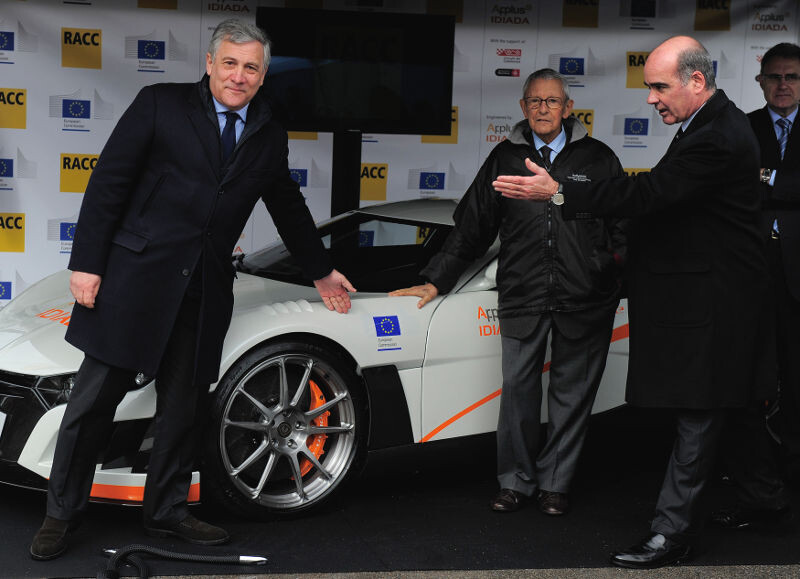Rights and Accountability 20 August 2013

Antonio Tajani (left) gears up for yet another “mission” in support of Israeli apartheid.
European UnionEvery time there has been tension between Israel and the European Union over the past few years a suave, silver-haired Italian has come to the rescue.
Antonio Tajani, the superhero in question, is up to his old tricks once more. In his capacity as the EU’s enterprise commissioner, Tajani is planning to visit Tel Aviv during October, accompanied by numerous high-flying businesspeople. The official purpose of his “mission for growth” — as it is being billed — is to stress that the EU and Israel are happy to trade with each other.
There is almost certainly a tacit purpose, too. Judging by his track record, Tajani will be hoping to distract from the controversy that arose over recently-published EU guidelines on preventing the allocation of subsidies to firms and researchers based in Israel’s settlements in the occupied West Bank.
Best buddy
On at least two previous occasions, Tajani has acted as Israel’s best buddy in the EU hierarchy. In January 2009, Tajani attended a conference on Space exploration in Tel Aviv. The speech which he delivered made no reference to the slaughter carried out by Israel in Gaza earlier that month. Rather, he underscored that Israel was a “valued partner” for the Union’s satellite navigation activities.
In March 2010, Tajani again put himself at Israel’s disposal. A formal meeting between Avigdor Lieberman, Israel’s then foreign minister, and senior EU representatives was cancelled at short notice after Israel voiced its displeasure over delays in implementing a new trade accord with the Union. Lieberman nonetheless went ahead with his planned visit to Brussels, where he met Tajani for lunch.
And even before he was nominated in 2008 to serve in the European Commission by Silvio Berlusconi, Italy’s prime minister at the time, Tajani was helping to bolster the Zionist lobby. During a stint as a member of the European Parliament, Tajani was a board member of European Friends of Israel, a cross-party alliance partly modeled on the American Israel Public Affairs Committee (AIPAC) in Washington.
Tajani has asked entrepreneurs wishing to join his entourage for the October trip to contact his staff by the end of this month. There is a high probability that arms merchants will sign up: a scene-setter prepared by the European Commission says that it will organize “business to business” meetings relating to “homeland security.”
In layperson’s terms, this means that Tajani wants to strengthen the ties between Israel and Europe’s war industries.
Greenwashing apartheid
Similarly problematic, Tajani will attend a major conference on “water technology and environmental control.” Briefing papers drafted for this event indicate it will involve a lot of “greenwashing” — an attempt to divert attention from Israeli apartheid by presenting Israel as ecologically-sound.
One brochure, for example, pats Israel on the back for its apparently sparing use of “scarce resources.”
A closer look at some of the conference’s sponsors reveals that Israel is really an environmental villain. Mekorot, the firm administering the West Bank’s water resources, has been accused by the UN Human Rights Council of exploiting Palestinian springs so rapaciously that they dry up.
Mekorot is an important player in Israel’s apartheid system. It engages in deep water drillings in the occupied Jordan Valley for the benefit of Israelis colonizing the West Bank. Whereas Israeli settlers have access to swimming pools and can marvel at irrigated floral displays all year round, Palestinians indigenous to that territory face chronic shortages of water.
Tajani is no stranger to the hospitality offered by corporations profiting from the occupation. In October 2011, he opened a “Go4Europe” business meeting in Tel Aviv. Veolia was a “platinum” sponsor for that event — the same Veolia which has built a tramway linking together Israel’s illegal settlements in East Jerusalem.
It is also important to highlight that Tajani is in charge of the EU’s program for “security research,” which was set up to boost the arms industry. Israel is the most active non-European participant in that scheme, which is part of the EU’s broader program for scientific research.
Despite the recent friction over the EU’s guidelines, both sides are now holding discussions about involving Israel in the Union’s next multi-annual program, running from 2014 and 2020. The issue of making sure that researchers headquartered in the settlements don’t receive subsidies is on the agenda for next month.
With hundreds of millions of euros in funding for Israeli universities and private firms at stake, I somehow doubt that Benjamin Netanyahu’s government will withdraw from scientific cooperation with the EU. My hunch is that a grubby compromise will be found that allows the EU to continue supporting the agents of Israeli apartheid.
The EU unfortunately appears to have no desire at the moment to end its cooperation with Israel. This makes the task of intensifying the campaign for a full boycott of Israel all the more important.





